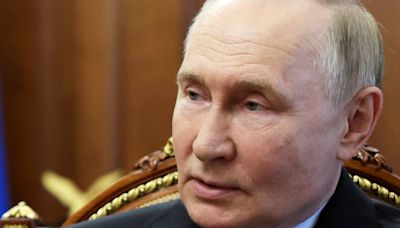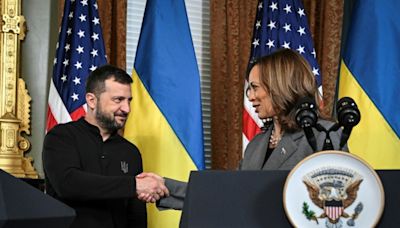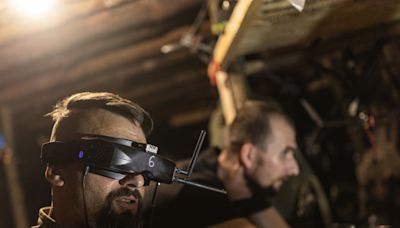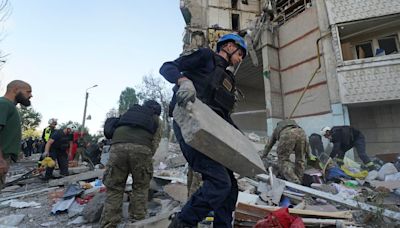Search results
Following the Christianization of Kievan Rus' in 988 during the reign of Vladimir the Great, the name Vladimir, along with other pagan names, was gradually replaced with Christian names, although the name Vladimir retained its popularity within the princely family in the following centuries.
Vladimir Vladimirovich Putin [c] [d] (born 7 October 1952) is a Russian politician and former intelligence officer who is the president of Russia. Putin has held continuous positions as president or prime minister since 1999: [ e ] as prime minister from 1999 to 2000 and from 2008 to 2012, and as president from 2000 to 2008 and since ...
The Grand Princes of Vladimir were originally crowned in Vladimir's Assumption Cathedral, but when Moscow superseded Vladimir in the 14th century as the seat of the Grand Prince, the Assumption Cathedral in the Moscow Kremlin became the site of their coronation.
- Overview
- Early career
- First and second terms as president of Russia
- Putin as prime minister
Vladimir Putin is a former Russian intelligence officer and a politician who has served as president of Russia from 1999 to 2008 and from 2012 to the present. He was also the country’s prime minister in 1999 and from 2008 to 2012.
Was Vladimir Putin in the KGB?
Vladimir Putin served for 15 years as a foreign intelligence officer in the KGB, the foreign intelligence and domestic security agency of the Soviet Union. In 1990 he retired from active KGB service with the rank of lieutenant colonel.
Why is Vladimir Putin still in power?
When Vladimir Putin was named president in 1999, Russia’s constitution limited the president to two consecutive terms. That’s why, after his second term ended in 2008, he served as prime minister before becoming president again in 2012. However, in January 2020 Putin drafted a constitutional amendment that would allow him to remain president for two more terms. It was included in a package of amendments that was approved by the Russian legislature and, in July 2020, by Russian voters in a national referendum.
How has Vladimir Putin changed Russia?
Putin studied law at Leningrad State University, where his tutor was Anatoly Sobchak, later one of the leading reform politicians of the perestroika period. Putin served 15 years as a foreign intelligence officer for the KGB (Committee for State Security), including six years in Dresden, East Germany. In 1990 he retired from active KGB service with the rank of lieutenant colonel and returned to Russia to become prorector of Leningrad State University with responsibility for the institution’s external relations. Soon afterward Putin became an adviser to Sobchak, the first democratically elected mayor of St. Petersburg. He quickly won Sobchak’s confidence and became known for his ability to get things done; by 1994 he had risen to the post of first deputy mayor.
In 1996 Putin moved to Moscow, where he joined the presidential staff as deputy to Pavel Borodin, the Kremlin’s chief administrator. Putin grew close to fellow Leningrader Anatoly Chubais and moved up in administrative positions. In July 1998 Pres. Boris Yeltsin made Putin director of the Federal Security Service (FSB; the KGB’s domestic successor), and shortly thereafter Putin became secretary of the influential Security Council. Yeltsin, who was searching for an heir to assume his mantle, appointed Putin prime minister in 1999.
On December 31, 1999, Yeltsin unexpectedly announced his resignation and named Putin acting president. Promising to rebuild a weakened Russia, the austere and reserved Putin easily won the March 2000 elections with about 53 percent of the vote. As president, he sought to end corruption and create a strongly regulated market economy.
Putin quickly reasserted control over Russia’s 89 regions and republics, dividing them into seven new federal districts, each headed by a representative appointed by the president. He also removed the right of regional governors to sit in the Federation Council, the upper house of the Russian parliament. Putin moved to reduce the power of Russia’s unpopular financiers and media tycoons—the so-called “oligarchs”—by closing several media outlets and launching criminal proceedings against numerous leading figures. He faced a difficult situation in Chechnya, particularly from rebels who staged terrorist attacks in Moscow and guerrilla attacks on Russian troops from the region’s mountains; in 2002 Putin declared the military campaign over, but casualties remained high.
Are you a student? Get Britannica Premium for only 24.95 - a 67% discount!
Learn More
Putin strongly objected to U.S. Pres. George W. Bush’s decision in 2001 to abandon the 1972 Anti-Ballistic Missile Treaty. In response to the September 11 attacks on the United States in 2001, he pledged Russia’s assistance and cooperation in the U.S.-led campaign against terrorists and their allies, offering the use of Russia’s airspace for humanitarian deliveries and help in search-and-rescue operations. Nevertheless, Putin joined German Chancellor Gerhard Schröder and French Pres. Jacques Chirac in 2002–03 to oppose U.S. and British plans to use force to oust Saddam Hussein’s government in Iraq.
Overseeing an economy that enjoyed growth after a prolonged recession in the 1990s, Putin was easily reelected in March 2004. In parliamentary elections in December 2007, Putin’s party, United Russia, won an overwhelming majority of seats. Though the fairness of the elections was questioned by international observers and by the Communist Party of the Russian Federation, the results nonetheless affirmed Putin’s power. With a constitutional provision forcing Putin to step down in 2008, he chose Dmitry Medvedev as his successor.
Soon after Medvedev won the March 2008 presidential election by a landslide, Putin announced that he had accepted the position of chairman of the United Russia party. Confirming widespread expectations, Medvedev nominated Putin as the country’s prime minister within hours of taking office on May 7, 2008. Russia’s parliament confirmed the appointment the following day. Although Medvedev grew more assertive as his term progressed, Putin was still regarded as the main power within the Kremlin.
While some speculated that Medvedev might run for a second term, he announced in September 2011 that he and Putin would—pending a United Russia victory at the polls—trade positions. Widespread irregularities in parliamentary elections in December 2011 triggered a wave of popular protest, and Putin faced a surprisingly strong opposition movement in the presidential race. On March 4, 2012, however, Putin was elected to a third term as Russia’s president. In advance of his inauguration, Putin resigned as United Russia chairman, handing control of the party to Medvedev. He was inaugurated as president on May 7, 2012, and one of his first acts upon assuming office was to nominate Medvedev to serve as prime minister.
- The Editors of Encyclopaedia Britannica
As Vladimir Putin nears his 70th birthday on Friday, how did he become the isolated autocrat who launched his disastrous invasion of Ukraine?
Sep 25, 2023 · Vladimir Putin took control of Russia as prime minister and president by the early 21st century, his time in power marked by invasions of Crimea and Ukraine.
May 7, 2024 · Weary troops stuck on front line as Ukraine struggles to find manpower. Russia flaunts Western tanks captured in war in Ukraine. "Putin thinks of himself now as Vladimir the Great, as a Russian...






